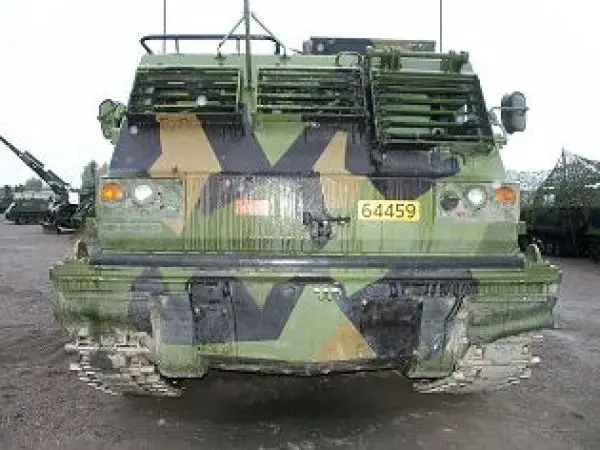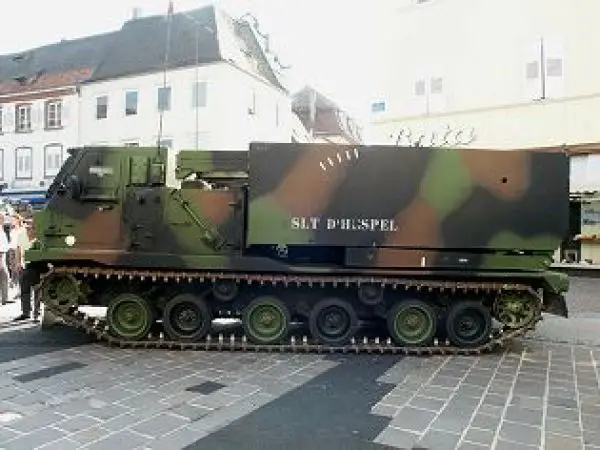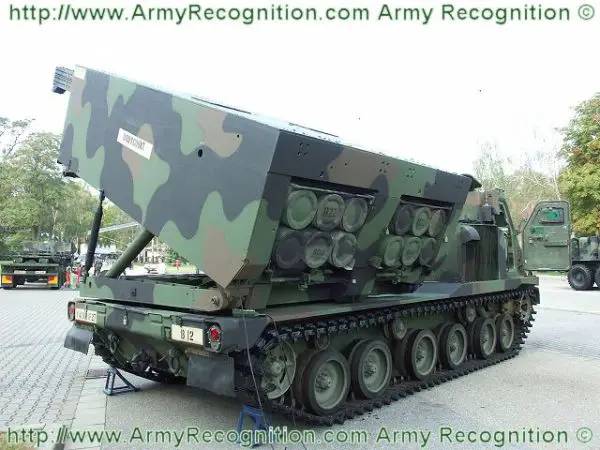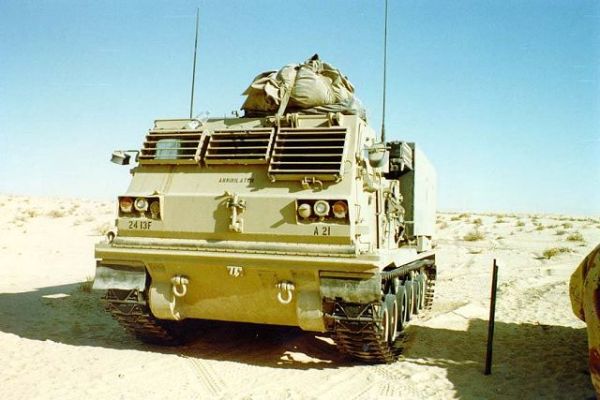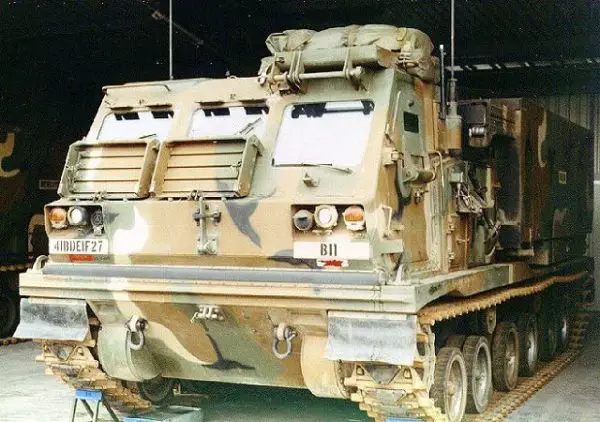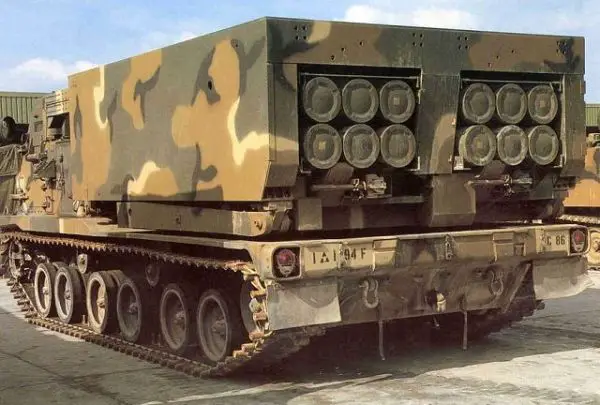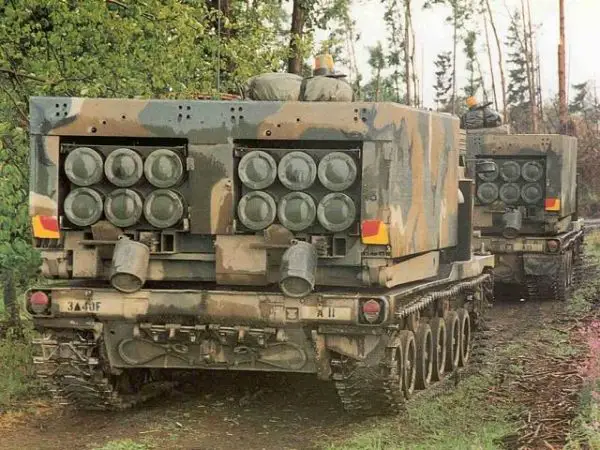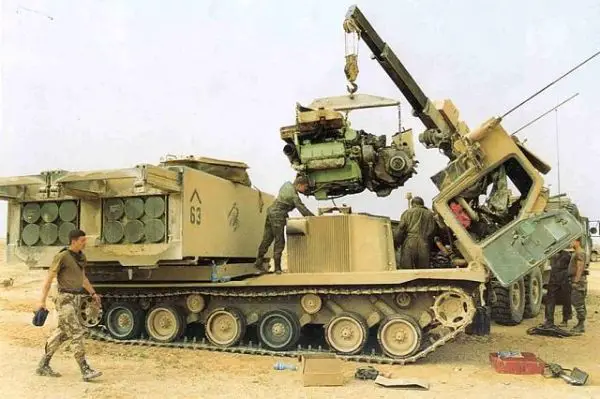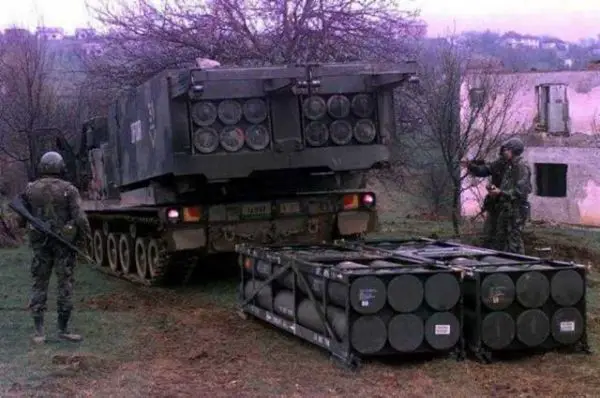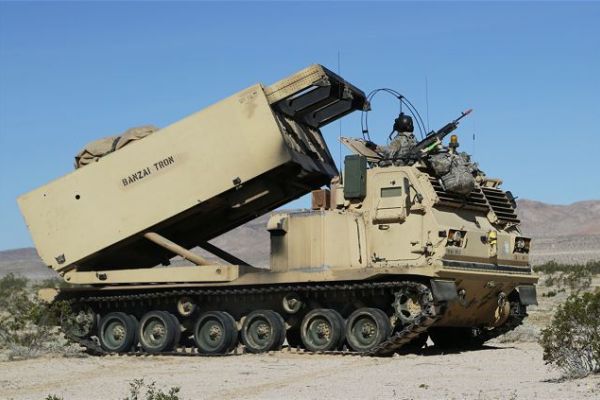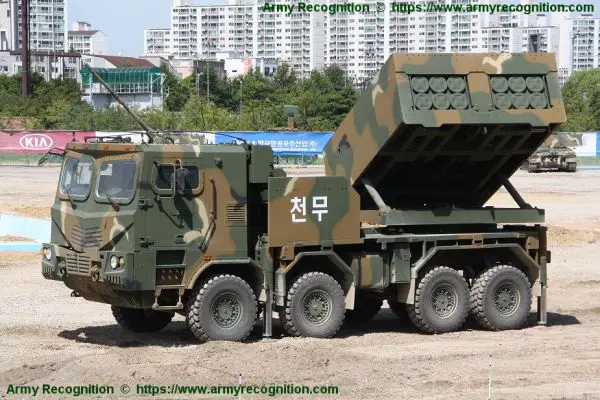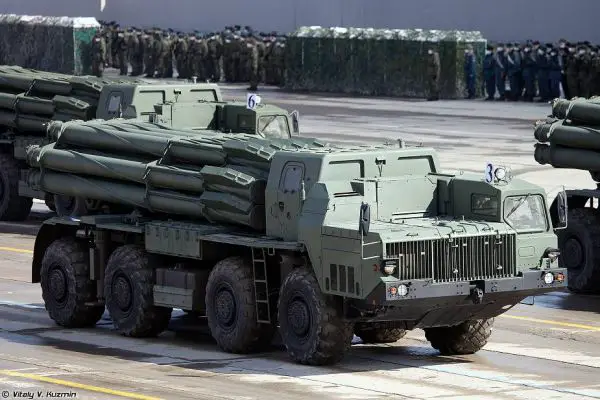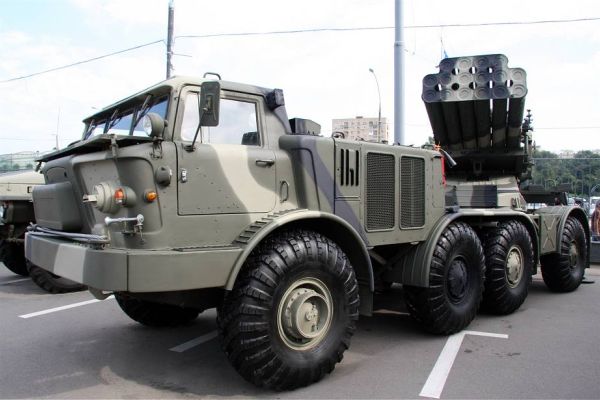Multiple Launch Rocket Systems.
M270 MLRS 227mm.

The M270 is a combat-proven 227mm Multiple Launch Rocket System (MLRS) artillery vehicle manufactured by Lockheed Martin Missiles and Fire Control. This artillery system is operational in the US Army, and fourteen countries have fielded or ordered MLRS: Bahrain, Denmark, France, Germany, Greece, Israel, Italy, Japan, South Korea, The Netherlands, Norway, Turkey, and the United Kingdom.
Country users: Bahrain, Denmark, Egypt, Finland, France, Germany, Greece, Israel, Italy, Japan, Netherlands, Norway, South Korea, Turkey, United Kingdom, United States
Description
The M270 is a combat-proven 227mm Multiple Launch Rocket System (MLRS) artillery vehicle manufactured by Lockheed Martin Missiles and Fire Control. The M270 MLRS is operational in the US Army, and fourteen countries have fielded or ordered MLRS: Bahrain, Denmark, France, Germany, Greece, Israel, Italy, Japan, South Korea, The Netherlands, Norway, Turkey, and United Kingdom. The system has also been built in Europe by an international consortium of companies from France, Germany, Italy, and the UK. In 1983, the first MLRS units entered service with the US Army. The Multiple Launch Rocket System is a high-mobility automatic system based on an M270 weapons platform. MLRS fires surface-to-surface rockets and the Army Tactical Missile System. The crew consists of three-man, including the driver, gunner and section chief, all of whom are seated in the fully enclosed cab at the front of the vehicle. Without leaving the cab the crew of three (driver, gunner and section chief) can fire up to twelve MLRS rockets in less than 60 seconds. MLRS was deployed in support of Operation Iraqi Freedom in March/April 2003. The US Army fielded the upgraded M270A1 launchers and the new ATACMS Quick Reaction Unitary missile. The US Army has decided to upgrade the M270 to the M270A1. In May 2001, Lockheed Martin conducted three successful developmental flight tests of the Multiple Launch Rocket System (MLRS) upgraded M270A1 launcher this week at White Sands Missile Range, N.M. A total of 23 MLRS rockets were fired successfully from the M270A1 over a two-day testing period. On June 29, 2022, Norway announced the donation of three M270 to Ukraine. In October 2022, the Italian Government agreed on the delivery to Ukraine of two M270 MLRS from its military inventory.
M270 MLRS variants:
- M270A1: The M270A1 program is a major upgrade to the MLRS launcher. It includes an Improved Fire Control System (IFCS) that features a Global Positioning System (GPS), as well as the ability to process large blocks of data from new smart munitions within tactical timelines. Operating and maintenance costs will be reduced because of greater reliability and ease of repair on IFCS parts.
The new M270A1 system also incorporates the Improved Launcher Mechanical System (ILMS) upgrade, which dramatically reduces the time needed to aim and reload the launcher. In a typical fire mission, the ILMS-equipped launcher is six times faster than the current M270 launcher. Reload time is decreased by more than 30 percent. Crew and launcher survivability will be greatly enhanced because total exposure time on the battlefield will be significantly reduced.
- M270A2: features Common Fire Control System (CFCS); new 600 hp engine, upgraded transmission, and launcher-loader modules; and Improved Armored Cabs (IAC). The A2 upgrades will allow the firing of the ER GMLRS rockets
Technical Data
-
Armament
The MLRS launcher unit comprises an M270 Launcher loaded with 12 rockets, packaged in two six-rocket pods. The launcher, which is mounted on a stretched Bradley chassis, is a highly automated self-loading and self-aiming system. It contains a fire control computer that integrates the vehicle and rocket-launching operations. The rockets can be fired individually or in ripples of two to twelve. Accuracy is maintained in all firing modes because the computer re-aims the launcher between rounds. The basic MLRS tactical rocket warhead contains 644 M77 munitions, which are dispensed above the target in mid-air. The dual-purpose bomblets are armed during freefall and a simple drag ribbon orients the bomblets for impact. Each MLRS launcher can deliver almost 8,000 munitions in less than 60 seconds at ranges exceeding 32km. MLRS also fires the long-range Lockheed Martin Army Tactical Missile System (ATACMS) guided missiles. The ATACMS family includes the Block 1, Block 1A, and Block 1A Unitary missiles. Block 1, which was used during Operation Desert Storm, carries 950 baseball-sized M74 sub-munitions to ranges exceeding 165km. The Block IA missile extends the range to more than 300km by reducing the sub-munition payload and adding GPS guidance. The Block 1A unitary missile, with a single-burst warhead, was first deployed in support of Operation Iraqi Freedom in March/April 2003. The M270A1 program includes two major upgrades to the current M270 launcher. Current plans for improvement to the system include the improved Fire Control System (IFCS), the Improved Mechanical Launch System (ILMS), and the extended range rocket (ER-MRLS).
-
Design and protection
The MLRS M270 self-propelled launcher vehicle is a stretched version of the American M2 Bradley infantry fighting vehicle. The Launcher Loader Module, mounted on the rear of the vehicle hull consists of a base, turret, and cage. To the front on the hull, is mounted a fully enclosed cab. This is protected against small arms fire and shell fragments by aluminum armor and louvered windows. The fire control panel is in the crew cabin. It is linked by wires to the fire control unit in the launcher. This sets off the rockets or missiles. The stabilizer checks the tilt or angle of the vehicle and the launcher's aim. The computer adjusts the aim after a rocket or missile fires in case the tilt has changed. The fire control system can be operated from inside the cabin by the M270's gunner or receive target information from the central command by radio.
-
Mobility
The M270 MLRS uses a derivative chassis of the armored infantry fighting vehicle Bradley named M993. The suspension system includes torsion bars, and on each side, there are six dual rubber-tired road wheels with the drive sprocket at the front and the idler at the rear. There are two track-return rollers that support the inside of the track only and one double roller. Hydraulic shock absorbers are fitted to the first, second, third, and sixth roadwheel stations. The MLRS is equipped with the VTA-903Y engine from Cummins Engine Co of Colombus, Indiana. The hydro-mechanical transmission HMPT-500 from Lockheed Martine provides three-speed ranges. The MLRS M270 can run at a maximum speed of 64 km/h with a maximum range of 483 km.
-
Combat Equipment
An overpressure ventilation system prevents rocket fumes from entering the cab and the vehicle is also equipped with a filtration unit to protect the crew from chemical, biological, and radiological particles. Equipment capabilities permit a reduced crew, or even one person, to accomplish a complete fire mission including the loading and unloading operations. The M270 MLRS can be readily transported to the area of operations, for example by the C-5 transporters aircraft or by train.
Specifications
-
Armament
12 rockets of 227 mm or one ATACMS missile
-
Country users
Bahrain, Denmark, Egypt, Finland, France, Germany, Greece, Israel, Italy, Japan, Netherlands, Norway, South Korea, Turkey, United Kingdom, United States
-
Designer Country
United States
-
Combat Equipment
NBC protection system, fire control system
-
Crew
3
-
Armor
Armor crew cabin protection against firing of small arms and artillery shell splinters
-
Weight
25,191 kg loaded; 20,189 kg empty
-
Speed Vehicle
64 km/h road speed
-
Range Vehicle
483 km
-
Dimensions
Length: 6.97 m; Width: 2.97 m;
Height: 2.61 m traveling: 5.92 m elevated

























